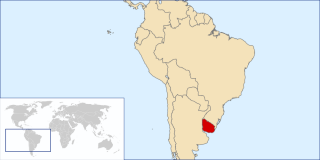Law and Crime
Uruguay Prepares to Legalize Marijuana
Legalization of marijuana in Uruguay can be an important source of data
Posted August 7, 2012

Uruguay
In a previous column, I wrote about moves in various countries, especially in Latin America, to end the global War on Drugs. Leaders in increasing numbers of countries are coming to the conclusion not only that the drug war cannot be won, but more importantly that it is the main cause of the crime, corruption, disease, and social chaos attributed to drugs. The point is that, rather than drugs causing these disasters, it is drug prohibition that creates a black market, and the black market that in turn causes the catastrophe.
Americans provoked a similar social disaster between the world wars during alcohol prohibition, and the problems receded once the country shifted to a policy of legalization and regulation. (I discussed Prohibition in another column.)
Now it appears that Uruguay is ready to take a major step to change course. In June, its President, José Mujica, called for “regulated and controlled legalization of marijuana.” He proposed that marijuana would be grown, taxed, and sold by the government, with taxes used for drug rehabilitation. Planning has reached the point where specific calculations are being made--e.g., that at least 5,000 pounds a month of marijuana would be needed to satisfy the country’s demand. The debate has shifted from whether to legalize to how best to go about doing so--e.g., should the government have a monopoly, or should individuals be allowed to grow small, non-commercial amounts for their own use?
One suggestion I would make to the Uruguayan government would be to keep good statistics on the use of multiple substances--legal and illegal--before, during, and after marijuana legalization. The government predicts that cocaine use will go down once this less dangerous alternative is made available. Opponents predict that usage will go up because the policy will normalize drug use. A reasonable case can be made that legalizing marijuana for adults should have little or no impact on cocaine use--that people use the substances they want regardless of their legal status--and that the main impacts will be on decreasing crime and corruption. Parallel three-way arguments could be made concerning the use of alcohol, tobacco, and other substances once marijuana is legal. Countries around the world will want to know what actually happens.
Since the United States has nearly 100 times Uruguay’s population and more than 50 times its landmass, the problems we will face when we finally decide to change course will be on a much larger scale. Rather than trying to prevent Uruguay from moving ahead, we should be grateful for the laboratory they will provide.
Image Source:
Uruguay Location; by Vardion
Check out my most recent book, The Myth of Race, which debunks common misconceptions, as well as my other books at http://amazon.com/Jefferson-M.-Fish/e/B001H6NFUI
The Myth of Race is available on Amazon http://amzn.to/10ykaRU and Barnes & Noble http://bit.ly/XPbB6E
Friend/Like me on Facebook: http://www.facebook.com/JeffersonFishAuthor
Follow me on Twitter: www.twitter.com/@jeffersonfish
Visit my website: www.jeffersonfish.com
Friend/Like me on Facebook


